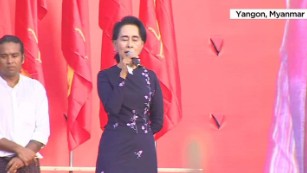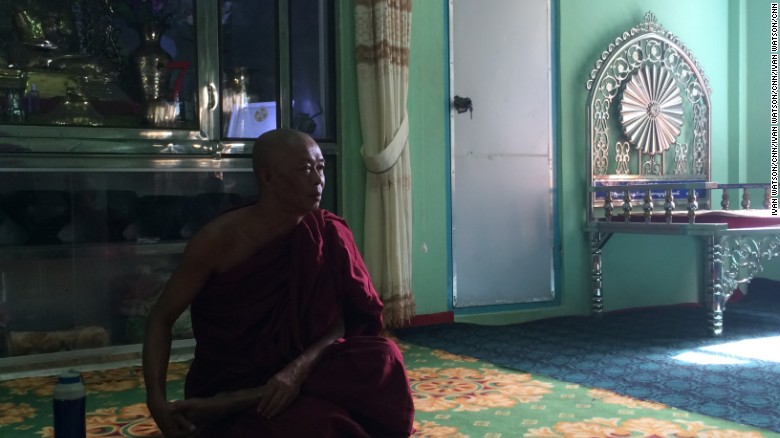Anti-Muslim tension simmers ahead of Myanmar election
It has been more than been two years since this town in Myanmar burned with the fires of deadly violence. Look closely, and there are haunting scars left behind.
The shells of mosques still stand -- torched, looted and overgrown with lush vegetation.
Local authorities have boarded up other mosques that weren't seriously damaged in mob violence by Meiktila's Buddhist majority against the Muslim minority. They did not answer reporters' questions about why.
At least 44 people were killed in days of clashes in April 2013 after a dispute erupted between Muslims and Buddhists in a market here, according to official figures.
Asked if the violence could explode again, a local Buddhist monk named U Wie Douktah answered with a wry smile, "There's a fifty-fifty chance."
In an overwhelmingly Buddhist country where angry anti-Muslim rhetoric is becoming increasingly part of mainstream discourse, U Wie Douktah is a symbol of tolerance.
In the spasm of violence 2½ years ago, the 57-year old abbot and his disciples provided sanctuary to more than 900 Muslims on the grounds of their monastery.
When a machete-wielding mob showed up in the middle of the night demanding the monks hand over the families, U Wie Douktah refused. He and his acolytes stood guard at the gates until dawn.
"He saved people's lives, so it's really, really important," said U Aung Thein, a Muslim lawyer, who sat at the abbot's feet at the end of October during a meeting at the monastery with other Muslim community leaders.
The monk dismissed recent religious tensions as artificial.
"It's all political," he said. "There are actually no problems between the religious communities themselves. But it has been influenced by political groups."
Ultranationalist monks
Myanmar, also known as Burma, is roughly 90% Buddhist, the CIA World Factbookestimates.
Popular passion for the faith was on display in the second-largest city of Mandalay in late October when crowds thronged pagodas and temples lighting candles to celebrate the Full Moon Festival, the Buddhist holiday known as Thadingyut.
And yet some powerful clerical voices insist Buddhism is in danger in this country.
In an interview with CNN, a monk named U Wirathu did not hesitate to name what he said is the No. 1 threat to his faith: Muslims.
"Their law requires Buddhist women who marry into their religion must convert (to Islam)," he said. "They take many wives and they have many children. And when their population grows they threaten us.
"And," he concluded, "they are violent."
U Wirathu is a founder of an ultra-nationalist Buddhist movement called the Committee to Protect Race and Religion, known locally as Ma Ba Tha.
The movement disseminates leaflets and sermons in which U Wirathu calls for a boycott of Muslim-owned businesses, even though according to the last official census Muslims make up around 4% of the country's population.
"Where the Muslims live, their mosques flourish," U Wirathu told CNN.
"They have a monopoly on business," he added, "and they don't allow other Buddhist businesses to grow."
In Myanmar, it is a cultural and religious taboo to criticize Buddhist monks.
But some observers suggest the hardline positions of U Wirathu and his colleagues have poisoned the atmosphere to the extent that the two largest parties in the country have chosen not to run any Muslim candidates for parliament in the upcoming election.
"They have shunned Muslim candidates," said U Aung Thein, the Muslim lawyer in Meiktila.
Monks and politics
In his interview with CNN, U Wirathu said that he did not endorse any political party in the upcoming election.
But he denigrated the country's largest opposition party, Aung San Suu Kyi's National League for Democracy.
Asked about an attack last week when men armed with machetes seriously wounded a National League for Democracy candidate campaigning in Yangon, U Wirathu said, "The attackers weren't happy about the party's positions.
"The party is quite weak," he added. "It cannot give the people what they want."
Critics accuse U Wirathu of inciting violence.
Meanwhile, the monk applauded a decision by the military-backed ruling party in July to approve a series of laws aimed at restricting interfaith marriage.
Under the law, Buddhist women must seek permission from authorities before marrying men of other faiths. Violators of the law could face imprisonment.
Such laws, and anti-Muslim rhetoric like U Wirathu's, have prompted international criticism.

Myanmar prepares for historic election
In a statement this week, U.N. Secretary-General Ban Ki-moon expressed "deep concern at the continuous resort to hate speech, the incitement of communal animosities and the abuse of religion for political purposes resorted to by extreme elements among the majority community in Myanmar."
In September, the embassies of the United States, Britain, Sweden, Japan, Norway, France, Denmark, Canada and Australia issued a joint statement expressing concern about "the prospect of religion being used as a tool of division and conflict" in the run-up to parliamentary elections set for Sunday.
READ MORE: Top U.N. official slams Myanmar monk over 'whore' comments
Embattled minority
Muslim community leaders in Meiktila complain that some landlords refused to allow Muslims to return to homes they were forced to flee in the violence of 2013.
In some neighborhoods, homes with inscriptions from the Quran on the façade stand empty. Their windows are shattered.
One of the few mosques still operating is so crowded that the faithful have made the unusual decision to pray in shifts on Fridays, the holiest day of the week for Muslims. Coils of razor wire now protect the walls of the mosque.
"It's still uncomfortable because there's still tension here," said Chan Nyiein Kyi, a Muslim dentist who treats both Muslim and Buddhist patients at his clinic. "There is a crisis happening between the two religions."
Muslim businessman U Minn Aung said, "Everyone is leaving." He moved his wife and daughters to Yangon after the 2013 riots.
U Minn Aung said he was hospitalized after a mob badly beat him during the violence. His hotel was destroyed by looters, he added, and now he is struggling to pay for a rented home for his family in the commercial capital while he runs a small shop in Meiktila.
The mob violence is over, but the intimidation is not.
"We feel like bloodless ethnic cleansing is underway," said the lawyer U Aung Thein.
Future generations
And U Wirathu's monastery now displays lurid posters outside for a new generation to see.
On a recent rainy day, 13-year-old schoolboys stood staring at the graphic photos, allegedly of attacks that Muslims carried out against Buddhist monks.
One student, On Joe Thee, said he and his friends had several Muslim classmates at school. "They mostly keep to themselves," he said.
Pointing at the posters, he said, "It's scary. The Muslims are violent."
News Courtesy: www.cnn.com











